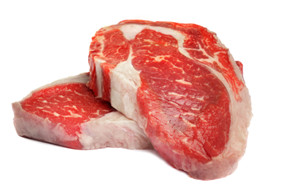The Diet Wars Heat Up Again
Author: Dr. Stephen Chaney
What is the best diet for weight loss? One week the headlines say that low-carbohydrate diets are better. The next week it’s low-fat diets that are better. There is even the occasional headline proclaiming that it doesn’t matter which diet you follow as long as you control your calories. It is no wonder that you are confused.
It is unusual, however, to have conflicting headlines within the same week, but that is exactly what happened last week. Let me take you behind the headlines to the actual clinical studies and help you sort through the conflicting headlines.
Are Low-Carbohydrate Diets Best For Weight Loss?
The manuscript behind this headline was published September 2nd in the Annals of Internal Medicine (Bazzano et al, Annals of Internal Medicine, 161: 309-318, 2014). This study was designed to determine which was the best diet for weight loss, low carb diet or low fat diet. The study recruited 148 overweight participants (mean age, 46.8, 88% female, 51% black) and randomly assigned them to either a low-fat diet or low-carbohydrate diet.
The participants on the low-fat diet were instructed to consume <30% of their calories from fat, while the participants on the low-carbohydrate diet were told to limit carbohydrates to <40 g/day. Neither group was told to limit calories. They met with a dietitian 10 times during the 12-month study and received information on dietary fiber (target = 25 g/day) and healthy fats (target = <7% saturated fat and little or no trans fats).
At the end of 12 months the low-carbohydrate diet resulted in significantly greater…
- Weight loss (7.7 pounds)…
- Decrease in triglyceride levels…
- Increase in HDL cholesterol…
- Decrease in the ratio of total to HDL Cholesterol…
…than the low-fat diet. In short, the results suggested that the low-carbohydrate diet was not only better than the low-fat diet for weight loss, but that it was also more effective in reducing risk factors for cardiovascular disease.
Case closed, you might be tempted to say. The low carb diet is the best the diet for weight loss. But there have been lots of other studies that have come to the opposite conclusion. So we have to ask the question: “Is this study significantly better than all of the studies that have failed to find any difference between the low-fat and low-carbohydrate diets with respect to weight loss and cardiovascular risk?”
What Are The Strengths & Weaknesses Of the Study?
Strengths of the Study: This was a very well designed study. In particular:
- Dietitians met with the participants at multiple times during the program to assure adherence to the diet, which was very good.
- The study utilized multiple dietary recalls, both during the week and on weekends.
- The study had a diverse population.
Weaknesses of the Study:
- The study did not control calories. In fact, the caloric intake was ~160 calories/day greater for the low-fat group than the low-carbohydrate group for at least the first 6 months of the study.
 That alone would be enough to account for the 7.7 pounds difference in weight loss.The reason for the higher caloric intake of low-fat group is not known. It could be due to the lower palatability of the low-carbohydrate diet. Alternatively, it could be due to the lower satiety of the low-fat diet. It was low in both fat and protein, both of which contribute to satiety (the feeling of fullness after we eat).
That alone would be enough to account for the 7.7 pounds difference in weight loss.The reason for the higher caloric intake of low-fat group is not known. It could be due to the lower palatability of the low-carbohydrate diet. Alternatively, it could be due to the lower satiety of the low-fat diet. It was low in both fat and protein, both of which contribute to satiety (the feeling of fullness after we eat). - The study did not specify the type of carbohydrates consumed. The dietitians instructed the participants on the type of fat they should be eating, but not the type of carbohydrate. That was a significant omission. Diets high in sugars and refined carbohydrates provide less satiety and adversely affect cardiovascular risk factors compared to diets where the carbohydrate comes primarily from fresh fruits, vegetables and legumes.
- The study did not control protein intake. In fact, the low-fat group consumed significantly less protein than the low-carbohydrate group. As I pointed out in a previous “Health Tips From the Professor” High Protein Diets and Weight Loss , higher protein intakes are essential for maintaining muscle mass during weight loss. That is important because loss of muscle mass can decrease metabolic rate (the rate at which we burn calories 24 hours a day – even at rest).
The amount of protein consumed by the low-carbohydrate group was close to the amount shown to maintain muscle mass during weight loss, while the amount of protein consumed by the low-fat group was close to the amount associated with loss of muscle mass during weight loss. That was reflected in the results. The low-fat group lost muscle mass while the low carbohydrate group actually gained muscle mass. The resulting difference in muscle probably meant that the low-carbohydrate group was burning more calories on a daily basis than the low-fat group.
In short, this is a good study, but it has important flaws. It is not a game changer.
Do Low-Carbohydrate & Low-Fat Diets Result In Identical Weight Loss?
The study behind this headline was published in the September 3rd edition of the Journal of the American Medical Association (Johnson et al, JAMA, 312: 923-933, 2014). This study was a meta-analysis that combined the results of 48 studies with 7286 participants. When the authors combined the data from all of the published studies there was no difference in weight loss for the low-fat and low-carbohydrate diets over a one or two year period.
The strength of the study is that it combines the results of multiple studies. That increases the statistical power of the observations and smoothes over the effect of outlier studies, such as the one described above. This is the study I would trust.
What Do The Experts Say?
Dr. Walter Willett, Chair of the Department of Nutrition at the Harvard School of Public Health was  quoted as saying: “…some people [would] do well on either diet. The key issue for each person is finding a way of eating that is healthy and can be maintained for the long term.”
quoted as saying: “…some people [would] do well on either diet. The key issue for each person is finding a way of eating that is healthy and can be maintained for the long term.”
Dr. Bradley Johnson (the author of the meta-analysis) was quoted as saying: “The take home message is that people should choose a diet they can adhere to…”
The Bottom Line
1) Ignore the recent headlines suggesting that low-carbohydrate diets may be more effective than low-fat diets for weight loss. When you control for calories and protein intake there is no difference between the two diets with respect to long term weight loss.
2) You can also ignore the headlines telling you that low-carbohydrate diets are better for cardiovascular health. You don’t need to avoid carbohydrates to have a healthy heart. You just need to make healthy carbohydrate choices – fruits, vegetables, legumes and whole grains instead of refined flour products and sugary junk food.
3) Experts will tell you that the best diet is a healthy diet that you can stick with long term.
4) My personal recommendations are to avoid extremes (either low-fat or low-carbohydrate). Instead:
- Aim for moderate amounts of healthy fats and healthy carbohydrates.
- Don’t ignore protein. Make sure you get enough protein to maintain your muscle mass.
- Control calories by reducing portion sizes and choosing healthy snacks.
These statements have not been evaluated by the Food and Drug Administration. This information is not intended to diagnose, treat, cure or prevent any disease.

